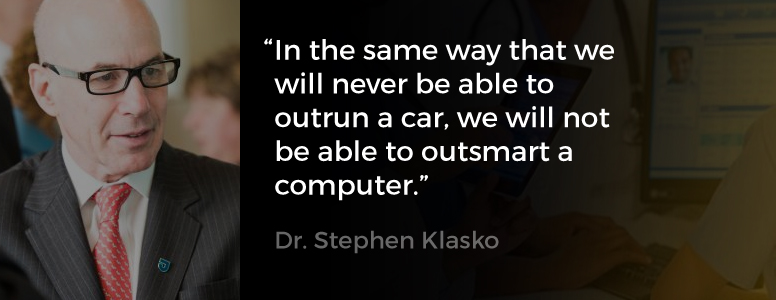Adaptive-Clinical Systems enjoyed a leadership role in establishing and helping organize the 5th Annual Life Sciences Collaborative Conference at the University of the Sciences in Philadelphia on March 6, 2018.

Dr. Stephen Klasko, President and CEO of Thomas Jefferson University and Jefferson Health, dissected the state of affairs in today’s healthcare world and shared his vision of what healthcare will look like by 2028.
Here are a few of the highlights and my observations:
- Looking back on the success of Apple, Inc., Klasko observed that Apple’s innovation strategy uncovered that their audience segment was transitioning from the “computer industry” to a “digital-lifestyle industry.” He then enumerated how outsiders can be the ones who disrupt traditional models because they are not jaded by their respective industry’s failures. For example, Tesla did not originate in Detroit nor did Uber stem from the transportation industry or iTunes spring from the entertainment business. He then asked who then, will be the one transforming the healthcare industry?
- A “mega” trend has surfaced where healthcare is moving from a world where hospitals and doctors were “the boss” to where “patients are the boss.” (We recognized this in our SCOPE highlights.) “Subjects” are now referred to as “patients” in clinical trials, perhaps in recognition of the fact that many are taking control back from the traditional institutions. What’s critical here is that the segment that steps up to meet this trend will own the future; it could be the payers or providers, or it could even be some patient advocacy group.
- On the topic of Augmented Intelligence– I must admit I wasn’t sure if this was a slip of the tongue to really mean artificial intelligence, but coming from Klasko — who is on the Watson Health Board and very tech savvy— I’ll take it as a prophecy. I feel that “artificial intelligence” is indeed a misnomer in healthcare and life sciences and that “augmented intelligence” is the correct phrase. Here’s how Network World differentiates the terms.

“… In the same way that we will never be able to outrun a car we will not be able to outsmart a computer. They never forget and they will always work faster than we do, but wisdom is something that a computer will never have… ”
And, a second prediction:
“Technology will do 80% of what a Physician will do. This boils down to the observation that those practitioners who embrace technology [delegate the IQ] and have an enriched OQ are the ones who will be best for the future of healthcare. Unfortunately, the medical schools of today are still evaluating and training their students with a ‘70’s style’ requisite of making the students memorize –stuff– things that patients can now look up on their own smart phones! This needs to be addressed through curriculum changes at our educational institutions preparing our future practitioners as well as hiring practices at our healthcare provider centers.”
- With regard to the health IT vendor role, Klasko shared some staggering statistics on the amount of data and patient records that are managed by EPIC and other EMR providers: In fact about 70% of all health data is within control of a single private company. As a provider we can relate that EPIC Orchard is an attempt, although a very expensive one. We believe that utilizing interoperability and integration tools with EPIC, Cerner, Athena Health, and Point Click Care will be the first step towards liberating this data for analysis and leverage in providing better automation, augmented intelligence, and, thus, better physicians.
In conclusion, it was refreshing to hear an introspective look at what can be done better as a provider rather than simply blame the payers, who then in turn blame the pharma companies, who then blame the government.
Here is additional content by Dr. Klasko–and be on the lookout for his latest book aptly named We Can Fix Healthcare.
Sina Adibi is the CEO of Adaptive Clinical Systems and a veteran of Pharma and Health IT industry.
About Adaptive Clinical Systems
Adaptive Clinical Systems offers a unique, simple, secure, validated, compliant, and cost-effective innovative solution for clinical data integration and interoperability. The cloud-based innovative Adaptive eClinical Bus® solution integrates clinical study data from multiple systems and platforms — EDC, eCOA, CTMS, Medical Imaging, IRT, analytical/data visualization systems and others — to ensure accurate and efficient transfer of clinical data for any study of any complexity while going well beyond simple and difficult to scale integration to full, real-time interoperability.
The award-winning Adaptive eClinical Bus software includes “connectors” for many leading clinical trial software tools from well-known vendors such as Omnicomm, Medidata, BioClinica, and Clinical Conductor to open source clinical trial tools such as OpenClinica and Clinovo. Connectors can also leverage internally-developed and proprietary systems and help customers retain their competitive edge. Adaptive Clinical’s eClinical Bus® can easily integrate technology into an interoperable, efficient, and accurate clinical trials system that streamlines processes and improves data reliability and offers the freedom to choose the best eClinical tools of any third-party or proprietary systems while enjoying all the benefits of a fully integrated system.

